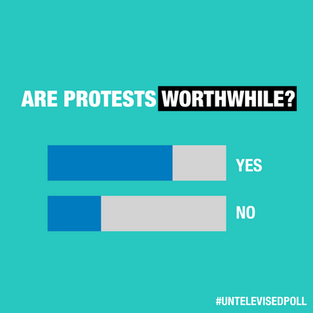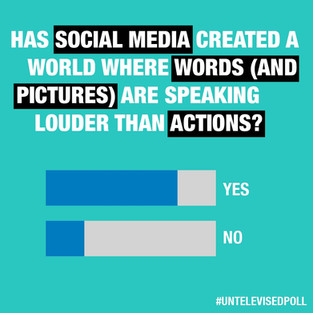Untelevised TV: Social Media for Social Change
- Fisayo Fadahunsi
- Jun 1, 2021
- 6 min read

*This article was originally written and published in Spanish for Mexican publication Llégale.
In recent history, every generation has been defined according to key characteristics, considered to be indicative of their time - Baby Boomers, Millennials, Gen Z and so on. Our media and political commentators will often try to categorise the ‘new’ ‘upcoming’ generation, with bold, simplistic statements. Certainly in the UK, we constantly see ‘young people’ defined through digestible, often conflicting headlines. ‘Young people are politically disengaged’; ‘young people are experiencing worse mental health than ever before’; ‘young people will save the environment’; ‘young people are more liberal than older generations’; young people could sway the UK election’; young people voted against Brexit’.
One thing which is always mentioned in relation to this ‘new generation’ and seems intrinsically linked to their identity, is social media. Whether it’s being blamed for the demise in their mental health or hailed for creating mass youth organising, such as the recent global climate protests. Psychologists, sociologists and policy makers alike are in constant debate about the impacts of social media; its benefits, its potential dangers and how it has and will shape collective human behaviour.
Although its overall benefit is disputed, its dominance and transformation of news and journalism is undeniable. It’s become the seemingly accessible, democratic alternative to the elitist traditional media that we know - both for the creators and consumers. The British media, for example, has notoriously been labelled ‘Pale, Male, Stale and Posh’, because our journalists are predominantly white (94%); male (55%); privately educated (51%); and university-educated (86%) with 54% having studied at Cambridge or Oxford University (the top two universities in the UK and amongst the most sought-after universities in the world). This lack of diversity affects both the voices reporting stories, but also the voices they choose to feature. This ‘single narrative’ can have real-life repercussions on how various groups in society are viewed and treated in their daily lives.
Social media however is in theory indiscriminate. It’s available to anyone with an internet connection and a device to post from (this access is still unequal, but a lot less so). This has been revolutionary for many marginalised communities, who can use online platforms to be seen; to tell their stories in their own words; get support for what they do; and to find kindred spirits and build solidarity. On a micro level, this can empower individuals and on a macro level it can lead to mass movements such as #BlackLivesMatter, #MeToo, #Grime4Corbyn etc.
This is the ideal with social media; the romanticism; the hope. The reality however is not as straightforward. Behind the scenes, mass corporations hold the power over these platforms and our data much more than we know. Your visibility on social media now depends more and more on paid advertising and people can make whole careers out of being ‘social media influencers’ where their ‘natural’ content is produced with big budgets, production teams and sponsorship - not in the heat of the moment on their old smartphone. Even big companies like Lush Cosmetics, with thousands of followers and big budgets, announced last year that they were removing their social media accounts as they didn’t want to compete in this restrictive environment. Platforms have been accused of being primarily for consumerism; being superficial; promoting narcissism; and encouraging people to just ‘talk’ about social change rather than actioning it. So, with all that complexity, how do we use it positively and to our advantage?

With Untelevised we wanted to reclaim what social media was meant to be - a place where you can reach likeminded people from all over the world, with minimal time and resources; a place to promote international, inspiring action and learn from others. A platform for ‘Citizen Journalism’. We wanted to disrupt the newsfeed; to make people pause and think; to normalise political engagement and help people realise that their very existence is political - they don’t need a degree in it to matter or play their part.
The concept came as we joined our two ‘industries’ together to meet at the intersection of media production and social activism. Fisayo Fadahunsi is the founder of film production company, Filmanthropy, who specialise in using the creative arts and participatory media for social good. Mona Bani co-directs a grassroots project May Project Gardens who support marginalised communities, such as refugees and asylum seekers. Fisayo had the media skills and Mona had access to content. Together we had it all and the partnership seemed obvious. We shared the same values for making information accessible and simple; reaching those on the margins; and promoting real action, not just hashtags. We saw this as a chance to give media opportunities to projects who don't have the time, expertise, equipment or confidence to create media themselves. Often the people who are truly working on the ‘frontline’, at ‘grassroots level’ - or any other terms we use to express authenticity - will not be the people shaping media narratives or having influence at a structural level.
One of the short films that we made whilst in Nijmegen, The Netherlands.
We launched in Feb 2019 with a visit to Nijmegen, a small city in the Netherlands known for its alternativism and social action; described by locals as ‘the Havana of Holland’. We visited creative and inspiring projects including Stadsnomaden (a self-sustaining, nomadic community), De Klinker (a free ‘cafe’ using surplus food to feed those in need) and Iewan (an ecological, cooperative, social housing estate); took part in their daily activities and identified the key concepts that we saw in their work. We found that similar themes were raised across projects - such as inclusivity, governance, survival - and we decided to tell the stories in the context of these themes, using the projects as case studies.
A lot of political discussions can be academic and therefore intimidating to many. Yet politics is something that affects us all, and it’s in all of our best interests to engage. We wanted to break down these barriers and go back to basics. Social media actually helps you do this because it encourages content to be concise and digestible eg. one minute videos, pictures, short captions etc - so this was a good challenge. We use features like explaining overused vocabulary in just one minute and encouraging interaction and discussion through polls to get feedback from our followers. Our aim was always for the action to be primary and the ‘platform’ secondary, so for us it's crucial to continue to be embedded in the work we depict. Last year, for example, we used the platform to campaign for a longstanding food justice project, Granville Community Kitchen, who are fighting the council to keep their premises. Our platform helped amplify their cause through offering them media expertise which they didn’t have.
Example of some polls that we've run on our instagram platform (@untelevised_tv)
Most recently, we've launched a podcast (inventively named, Untelevised: The Podcast), a format that has allows us to have slightly deeper, more nuanced conversations. Each episode we meet guests who have dedicated themselves to changing the status quo. Using open, honest conversations we explore what that change really looks like and how we can all play our part in it. We hope that it is bringing something different to the podcasting world. Through speaking to everyday people who want to make a change by exploring the journeys of everyday people who are doing just that. Now in its fifth episode, we've already covered topics from 'So, what's an uprising?' to 'So, how do we change systems?' And our guests have ranged from Azar, a political refugee of the Iranian Revolution to Cleo, the former Lord Mayor of Bristol and candidate for Deputy Leader of the Green Party.
We need more people to share their skills, their energy and their passion for social justice this way; to hold our media establishment accountable and tell the stories that aren’t told. All you need is the will and a smartphone - not even a fancy one. Don’t overthink it. Start simple and consider what you may have access to that others don’t. Play to your strengths and don’t try to produce something in a style that already exists. We found that people recognise and appreciate honesty and authenticity.
Some of the guests and themes featured on Untelevised: The Podcast.














Comments